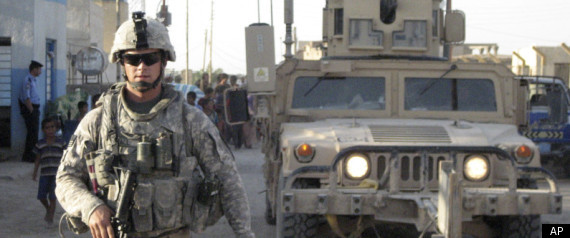Iraq: The War Is Not Over In Country's South

Iraq: The War Is Not Over In Country's South

COS GARRY OWEN, Iraq Soldiers at this base sleep with their shoes on so they don't cut their feet running under rocket fire. Elsewhere in Iraq the tanks are being packed up, but here they still serve in the hunt for insurgents. And when U.S. troops hand out soccer balls to village children, Apache helicopters circle above.
In a little more than 100 days, the U.S. military is supposed to be gone from Iraq after a war, insurgency and occupation that has stretched across nearly nine years. But in marshy southern Iraq, where Shiite militancy runs strong, the war is still being waged.
At Contingency Operating Station Garry Owen, the last American military base in the southern province of Maysan, Maj. Steven Gventer spells out their doctrine: "You don't want to be soft and chewy. You want to be hard and prickly. And we are hard and prickly at Garry Owen. ... focused on getting out and aggressively trying to target bad guys."
Garry Owen, named after the fabled U.S. Cavalry song, sits in treacherous territory next to Iran, near weapons' smuggling routes, in a province whose governor views them as "occupiers."
This territory, known most of 2011 as United States Division-South on the military maps, plays a vital role in combating the militias and protecting U.S. convoys heading south on their way home. But the challenges they face hint at the wider problems still facing Iraq and any residual American force that stays beyond the Dec. 31 departure deadline.
To Americans who battled al-Qaida's allies farther north, in Mosul or Fallujah, southern Iraq promised to be quieter.
"When I was told I was going to USD-South I said 'USD-South?' What the heck happens in USD-South?'" recalled Lt. Col. Tim Brumfiel, Sr., who commands the 3rd Battalion, 8th Cavalry Regiment, based at Fort Hood, Texas.
To him it was "a small blip on the radar screen." But within days of the troops' arrival in February, the trouble started roadside bombs, 107 mm rockets, and a particularly lethal type of rocket-propelled mortar.
In the southern marshes that straddle the Iraq-Iran border, weapons smugglers slip past the water buffalo and reed huts to easily elude the poorly paid and under-equipped Iraqi guards and fan out across southern Iraq to supply Shiite militias.
Ties with Iran have always been close, and the governor of Maysan is a follower of anti-American cleric Muqtada al-Sadr, which made for a frosty relationship with the newly arrived battalion and left the Garry Owen base isolated and vulnerable.
Prime Minister Nouri al-Maliki is vulnerable too. He depends on Sadrist support, but is negotiating with the U.S. about keeping some American troops in Iraq beyond December something the Sadrists fiercely oppose. Then again, Iraqi nationalists look with suspicion on perceived attempts by Iran to use allies like al-Sadr to deepen their influence, especially in the south.
So when Brumfiel's battalion arrived, it stepped into a fraught situation and a mission that quickly changed.
The Americans had come with orders to train Iraqi security forces. Instead, Brumfiel used more and more men and resources battling Shiite militias. He brought in tanks, rarely used anymore by American forces elsewhere in Iraq, because they could better spot militants and scare them off.
The battalion also stepped up its presence around the base and started patrolling deep into the marshes.
During a recent patrol, Lt. Lon McBride pointed out a 5-meter- (15-foot-) deep crater caused by a misfired rocket. Insurgents had set themselves up in a village house undeterred by an Iraqi checkpoint about 100 meters (yards) away.
In July, when fire directed at the base more than doubled and a U.S. soldier was killed, the U.S. military mounted a training mission involving AC-130 gunships and Apache helicopters. The show of force threw the local government into a "tizzy," said Brumfiel.
Government officials claimed the U.S. was terrorizing the local population, and a delegation was sent from Baghdad to investigate. But far from siding with the local government, it replaced the Iraqi police chief. The new police chief joined an Iraqi Army general who was also new to the province. Both have been praised by American commanders for being much more aggressive in targeting Shiite militias.
The Iraqi Army launched stepped up patrols, checkpoints and operations designed to hinder the militiamen, and August saw a marked improvement in security at the base and around the country. No American forces were killed in combat anywhere in Iraq, and at Garry Owen the rocket attacks plummeted. So far, no Americans have been killed in combat in Iraq this September.
U.S. commanders acknowledge that it's hard to pinpoint exactly why. Among the theories: the U.S. and Iraqi Army's anti-militia operations, Iraqi moves to curb smuggling, or U.S. threats of action against Iran. Al-Sadr has also moved to rein in disobedient militias and announced days ago that he would halt attacks on U.S. forces as they withdraw from Iraq.
The critical question is whether the Iraqi security forces will keep the pressure on the Shiite militias as the withdrawal picks up speed. The Iraqi security forces, dominated by the country's Shiite majority, have been much more aggressive in pursuing Sunni militants than in targeting Shiite militias. So far, officers at Garry Owen say they've been happy with the improvement but will keep hammering the weapons smugglers and thus increase the protection of convoys passing through this fall en route to Kuwait.
Iraq: The War Is Not Over In Country's South



